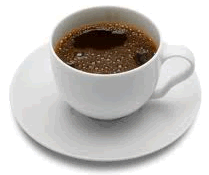Coffee
Improves Response to Hepatitis C Treatment
SUMMARY
Drinking more coffee -- but not tea -- was associated with
greater likelihood of response to hepatitis C treatment with
pegylated interferon/ribavirin in the HALT-C study. |
By
Liz Highleyman
 Over
years or decades, chronic hepatitis
C virus (HCV) infection can progress to severe liver disease
including cirrhosis
and hepatocellular
carcinoma. A number of previous studies have found that higher
consumption of caffeine or coffee specifically is associated with
improved liver health and slower disease progression, but its
relationship to hepatitis C treatment response is not fully understood.
Over
years or decades, chronic hepatitis
C virus (HCV) infection can progress to severe liver disease
including cirrhosis
and hepatocellular
carcinoma. A number of previous studies have found that higher
consumption of caffeine or coffee specifically is associated with
improved liver health and slower disease progression, but its
relationship to hepatitis C treatment response is not fully understood.
As
described in the June
2011 issue of Gastroenterology, Neal Freedman from
the National Cancer Institute and colleagues looked at the relationship
between coffee consumption and treatment response in the HALT-C
(Hepatitis C Antiviral Long-Term Treatment against Cirrhosis)
trial, which was designed to show whether long-term pegylated
interferon maintenance therapy could reduce the risk of liver
disease progression in non-responders.
The
analysis included 885 participants with bridging fibrosis or cirrhosis
(Ishak stage F3-F6) who did not achieve sustained response to
prior antiviral therapy. In the HALT-C lead-in phase, they were
re-treated with 180 mcg/week pegylated interferon alfa-2a (Pegasys)
plus 1000-1200 mg/day weight-adjusted ribavirin. At week 24, non-responders
were randomly assigned to either discontinue treatment or continue
on low dose (90 mcg/week) pegylated interferon monotherapy.
Based
on food questionnaires, the researchers recorded participants'
coffee consumption during the past year before re-treatment, categorizing
it as none, < 1 cup per day, 1 to < 3 cups per day, or 3
or more cups per day. About 15% of patients were non-drinkers
and about the same proportion drank 3 or more cups.
Treatment response was assessed at week 12 (early virologic response
or EVR), week 20, week 48 (end-of-treatment response), and week
72 (sustained virologic response or SVR).
Results
 |
People
who drank 3 or more cups of coffee per day had double the
drop in HCV RNA viral load from baseline compared with non-drinkers
(median 4.0 vs 2.0 log, respectively). |
 |
About
60% of patients who drank the most coffee tolerated full-dose
treatment, compared with about 50% of non-drinkers. |
 |
In
an unadjusted analysis, the heaviest coffee drinkers were
about 3 times more likely than non-drinkers to respond to
treatment. |
 |
After adjusting for sex, age, race/ethnicity, alcohol use,
presence of cirrhosis, AST/ALT ratio, IL28B pattern, interferon
dose reduction, and other factors affecting response, people
who drank the most coffee were still about twice as likely
to respond to treatment: |
| |
 |
Early
virologic response: odds ratio 2.0 for > 3 cups vs
none; |
 |
Week
20 response: odds ratio 2.1; |
 |
End-of-treatment
response: odds ratio 2.4; |
 |
Sustained
virologic response: odds ratio 1.8. |
|
 |
Response
rates were significantly higher for heavy coffee consumers
compared with non-drinkers at all time points: |
 |
Early
virologic response: 76% vs 46%, respectively; |
 |
Week
20 response: 52% vs 26%, respectively; |
 |
Sustained
virologic response: 26% vs 11%, respectively. |
|
These
findings led the researchers to conclude, "High-level consumption
of coffee (more than 3 cups per day) is an independent predictor
of improved virologic response to peginterferon plus ribavirin
in patients with hepatitis C."
"Coffee has > 1000 compounds, any one of which could be
involved in virologic response," they explained in their
discussion. "One major constituent of coffee is caffeine.
Although we could not distinguish caffeinated from decaffeinated
coffee in our study, we found no association with consumption
of black or green tea."
"It
is unlikely that coffee and its constituents have a direct antiviral
effect," they continued. "If so, HCV RNA levels at baseline
would have been expected to be lower with greater coffee consumption.
In fact, baseline levels were actually higher with greater consumption.
More likely coffee would have a facilitating effect on response
to peginterferon and ribavirin treatment by a mechanism yet to
be understood."
Investigator
affiliations: Nutritional Epidemiology Branch, Division of Cancer
Epidemiology and Genetics, National Cancer Institute, National
Institutes of Health, Department of Health and Human Services,
Rockville, MD; New England Research Institutes, Watertown, MA;
Office of the Director, National Institute of Diabetes and Digestive
and Kidney Diseases, National Institutes of Health, Department
of Health and Human Services, Bethesda, MD; Division of Gastrointestinal
and Liver Diseases, Keck School of Medicine, University of Southern
California, Los Angeles, CA; Division of Digestive Diseases and
Nutrition, National Institute of Diabetes and Digestive and Kidney
Diseases, National Institutes of Health, Department of Health
and Human Services, Bethesda, MD.
6/21/11
Reference
ND Freedman, TM Curto, K Lindsay, et al (HALT-C Trial Group).
Coffee consumption is associated with response to peginterferon
and ribavirin therapy in patients with chronic hepatitis C. Gastroenterology
140(7):1961-1969 (abstract).
June 2011.
